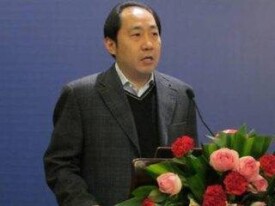共找到74條詞條名為張衛東的結果 展開
- 中國民俗學會北京分會常務理事
- 廣西省大新縣委副書記
- 曾任駐馬店市司法局局長
- 雲南迪慶州委副書記、德欽縣委書記
- 山西介休市副市長
- 上海交通大學教授
- 陝西省林業局副局長
- 河南駐馬店軍分區政委
- 內蒙古河套酒業集團有限公司副董事長
- 廊坊市政協副主席
- 宿遷市委組織部常務副部長
- 濉溪縣公安局原副局長
- 劉雲山弟子
- 油氣井工程系黨支部書記兼系副主任
- 江蘇省物價局局長、黨組書記
- 青海省海西州天峻縣副縣長
- 上海雅蘭書畫藝術進修學校校長
- 北京通州區委宣傳部副部長
- 天津市第一中心醫院胸外科主任醫師
- 河南省漯河市中級人民法院執行二庭庭長
- 烏魯木齊市城建股份有限公司黨委副書記
- 貴州省國家稅務局副巡視員
- 四川雙流中和中學校長
- 中國國家書畫院副院長
- 內江市文廣新局文化市場科科長
- 第二軍醫大學藥學院教授
- 內蒙古環境保護投資有限公司黨委副書記
- 上海航天技術研究院某型號火箭總指揮
- 山東農業大學農學院教授
- 東阿縣信訪局局長
- 原榆中縣副縣級幹部
- 遼寧省商務廳外貿管理處處長
- 江蘇省政協經濟委員會副主任
- 上海文聯藝術品鑒定中心成員
- 民族宗教事務委員會原副主任
- 石首市政協秘書長
- 文化建設專家
- 德州市體育局黨組副書記、體育總會主席
- 輪台縣委610辦公室副主任
- 浙江省浦江縣人民政府副縣長
- 2019年5月“中國好人榜”人物
- 中國石油大學石油工程學院黨委書記
- 上饒珠湖地區人民檢察院原檢察員
- 張丁衛東
- 太原大學教授
- 山西省雕塑家協會主席
- 山西中醫學院教研室主任
- 宿州市埇橋區住房和城鄉建設局副局長
- 北京盛邦投資有限公司總裁
- 華東師範大學心理學院教授
- 四川省密碼管理局局長
- 安徽省黃山市黃山區委常委、人武部政委
- 浙江省第十三屆人民代表大會代表
- 海南華僑中學副校長
- 新疆兵團第十三師黨校副校長
- 利津縣市優秀教師
- 市中區魏家莊街道辦事處社區服務中心主任
- 燕山大學外國語學院教授
- 湖北省物價局局長
- 成都市錦江區人大常委會副主任
- 襄陽市住房投資有限公司總工程師
- 和田地區一中黨委委員、紀檢書記
- 汕頭大學中文系副教授
- 2020珠峰高程測量登山隊支援組組員
- 江西綠強農林集團有限公司董事長
- 濮陽市原公務員
- 山西省文化和旅遊廳副巡視員
- 華中科技大學經濟學院教授
- 福瑞斯(香港)國際集團有限公司董事
- 北京化工大學化學工程學院教授
- 南京航空航天大學外國語學院碩士生導師
- 華北電力大學電力系副主任
- 中華人民共和國駐冰島共和國原特命全權大使
- 霍州市政府黨組成員
張衛東
上海交通大學教授
張衛東,男,研究方向為多變數控制、網路化控制系統。
張衛東,男,1967年生。上海交通大學自動化系教授,博士生導師,國家傑出青年科學基金獲得者, 德國洪堡學者,上海市優秀學科帶頭人,賽博協同創新中心方向責任科學家。現任上海市優化與控制軟體工程研究中心主任、上海高校船舶自動化工程研究中心主任和上海交通大學自動化系副主任。長期從事控制理論及應用研究。論文被SCI他引459次,獲得國家發明專利授權26項;理論成果在造紙、發電、精密儀器和海洋工程等領域得到成功應用。榮獲全國高校霍英東優秀青年教師獎和2項省部級自然科學二等獎等12項獎勵, 培養的學生3次榮獲上海市優秀博士生學位論文。曾擔任以色列國家基金海外評委、國家創新人才計劃評審專家和國家科技獎勵評審專家。
張衛東,男,1967年生於黑龍江大慶市。1990、1993和1996年於浙江大學分別獲得學士, 碩士和博士學位,1998年於上海交通大學完成博士后研究后留校任教, 工作至今。1999年晉陞教授, 2000年被聘為博士生導師,2003-2004年作為洪堡學者工作於德國斯圖加特大學,2007-2008年2007-2008作為訪問教授工作於美國普林斯頓大學。
是國家傑出青年科學基金獲得者,上海市優秀學科帶頭人,賽博協同創新中心方向責任科學家。目前擔任上海市優化與控制軟體工程研究中心主任、上海高校船舶自動化工程研究中心主任和上海交通大學自動化系副主任。曾擔任西班牙巴塞羅那自由大學兼職博導、以色列國家基金和羅馬尼亞國家研究發展基金海外評委、國家、上海市和浙江省基金項目評審專家、國家創新人才計劃評審專家和國家、教育部、浙江省、廣東省和中航集團科技獎勵評審專家和上海市中外合作辦學評估會評專家。
主要研究方向包括(1) 複雜系統建模、控制與優化,(2) 控制與大數據理論在智能發電、無人船和航空航天領域的應用。在學術上提出了定量過程式控制制的學術思想, 相關成果已總結成英文專著在CRC Press出版; 發表SCI論文90篇,其中29篇論文發表在IF>2的刊物,論文被SCI他引459次,理論成果在造紙、發電、精密儀器和海洋工程等領域得到成功應用,獲得國家發明專利授權26項。曾榮獲全國高校霍英東優秀青年教師獎和2項省部級自然科學二等獎等12項獎勵。
與美國普林斯頓大學等4所國際知名大學聯合培養中外博士生,培養的博士生中有3人分別於2007、2009和2013年獲得上海市優秀博士學位論文,有1人於2009年獲得德國洪堡基金, 1人於2012年獲得國家青年千人,2人分別成長為中山大學和大連理工大學特聘教授, 另有1人成長為中山大學教授、5人成長為985/211高校副教授。
入選國家傑出青年科學基金、德國洪堡洪堡學者、上海市優秀學科帶頭人、教育部首屆新世紀優秀人才計劃、上海市啟明星/優秀啟明星計劃和國家自然科學基金創新群體,榮獲全國高校霍英東優秀青年教師獎和2項省部級自然科學二等獎等12項獎勵,所撰寫的教材獲得上海普通高校優秀教材獎,培養的學生3次榮獲上海市優秀博士生學位論文,9次榮獲Rockwell優秀教師、校優秀教師和校優秀共產黨員。
曾主講IEEE試點班核心課程《控制理論》、本科生核心課程《現代控制理論》、《智能控制理論》和《計算機原理與介面技術》,研究生課程《高級過程式控制制》和《先進過程式控制制》。
學習經歷:
1986.09-1990.07 浙江大學 科儀系 本科
1990.09-1993.01 浙江大學 電機系 碩士
1993.03-1996.05 浙江大學 工控所 博士
工作經歷:
1996.06-1998.05 上海交大 自動化系 博士后
1998.06-1999.11 上海交大 自動化系 副教授
1999.12-至今 上海交大 自動化系 教授
2000.12-至今 上海交大 自動化系 博導
其中
2003.08-2004.12 德國斯圖加特大學 洪堡學者
2007.04-2008.03 美國普林斯頓大學 訪問教授
中國自動化學會控制理論專業委員會 委員
中國自動化學會過程式控制制專業委員會 常務委員
中國自動化學會智能控制專業委員會 委員
(1) 複雜系統建模、控制與優化,(2) 控制與大數據理論在智能發電、無人船和航空航天領域的應用
系統建模與控制,國家傑出青年科學基金
船舶動力定位自適應控制技術,上海市優秀學科帶頭人
控制理論與方法—網路系統的設計、控制與優化,NSFC創新群體
主持和參加了20餘項國家和省部級科研項目。
《Quantitative Process Control Theory》
Author: Weidong Zhang
Hardcover: 473 pages
Publisher: CRC Press (December 2, 2011)
Language: English
ISBN-10: 1439855579
ISBN-13: 978-1439855577
Quantitative Process Control Theory explains how to solve industrial system problems using a novel control system design theory. This easy-to-use theory does not require designers to choose a weighting function and enables the controllers to be designed or tuned for quantitative engineering performance indices such as overshoot.
In each chapter, a summary highlights the main problems and results and exercises improve and test your understanding of the material. Mathematical proofs are provided for almost all the results while examples are based on actual situations in industrial plants involving a paper-making machine, heat exchanger, hot strip mill, maglev, nuclear reactor, distillation column/heavy oil fractionator, jacket-cooled reactor, missile, helicopter/plane, and anesthesia.
Developed from the author’s many years of research, this book takes a unique, practical approach for efficiently solving single-input and single-output (SISO) and multiple-input and multiple-output (MIMO) control system design issues for quantitative performance indices. With much of the material classroom-tested, the text is suitable for advanced undergraduate and graduate students in engineering, beginning researchers in robust control, and more seasoned engineers wanting to learn new design techniques.
1 Zhang,W.D., and Y.X. Sun (1996). Modified Smith Predictor for controlling Integrator/Time Delay Processes, Ind. Eng. Chem. Res., 35(8), 2769-2772
2 Zhang, W. D., Y.X. Sun, and X.M. Xu (1998). Two Degree-of-Freedom Smith Predictor for Processes with Time Delay, Automatica, 34(10), 1279-1282.
3 Zhang,W.D., and X.M. Xu(2000). Quantitative Performance Design for Inverse Response Processes, Ind. Eng. Chem. Res., 39(6), 2056-2061.
4 Zhang,W.D., X.M. Xu (2002). On minimal-order stabilization of minimum phase plants, Automatica, 38(7), 1243-1246.
5 Zhang,W.D., D.Y. Gu, W. Wang, and X.M. Xu (2004). Quantitative performance design of a modified smith predictor for unstable processes with time delay, Ind. Eng. Chem. Res., 43 (1), 56-62.
6 Zhang,W.D., Linlin Ou, Danying Gu. (2006). Algebraic Solution to H2 Control Problems-Part I: The Scalar Case, Ind. Eng. Chem. Res., 45(21), 7151-7162.
7 Wang, Ping, Danying Gu, Weidong Zhang. (2007). Modified Relay Feedback Identification Based on Describing Function Analysis, Ind. Eng. Chem. Res., 46 (5): 1538-1546.
8 Weidong Zhang, Jochen M. Rieber, Danying Gu (2008). Optimal Dead-Time Compensator Design for Stable and Integrating Processes with Time Delay, Journal of Process Control, 18, 449-457
9 Ou, Linlin, Weidong Zhang, Li Yu (2009). Low-order Stabilization for LTI Systems with Time Delay, IEEE Trans. on Automatic Control, 54(4), 774-787( FULL PAPER)
10 Alcántara, Salva, Weidong Zhang, Carles, Pedret, Ramon Vilanova, Siguard Skogestad (2011). IMC-like Analytical H-infinity design with S/SP mixed sensitivity consideration: Utility in PID tuning guidance, J. of Process Control, 21(6), 976-985
11 Wei Zhang, Shihe Chen, and Weidong Zhang (2012). Two-Degree-of-Freedom Controller Design for An Ill-Conditioned Process Using H2 Decoupling Control, Ind. Eng. Chem. Res., 51(45), 1472-1478
12 B. Sun, W. Zhang, W. Zhang, and Z. Li (2014), “Optimal H 2 Input Load Disturbance Rejection Controller Design for Nonminimum Phase Systems Based on Algebraic Theory,” Ind. Eng. Chem. Res.,53(51), 472-478
